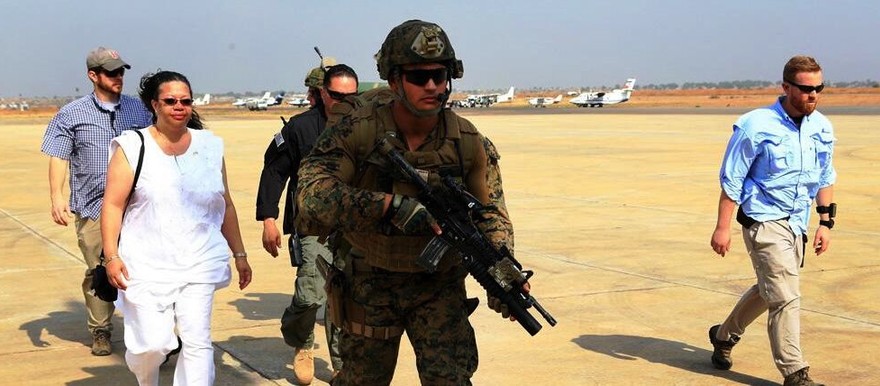Evacuations by the United States and United Nations of personnel from embassies and bases in South Sudan are alarmist and unnecessary, says presidential spokesman Ateny Wek.
He has criticized both the US and the UN for heightening unwarranted fears of an attack on Juba. The criticism comes after the US Department of State ordered the departure of ‘most’ of its remaining personnel in Juba on Friday
The US State Department “warns US citizens against all travel to the Republic of South Sudan and recommends that US citizens currently in South Sudan depart immediately,” it said the same day, citing the “deteriorating security situation.”
Ateny Wek dismissed the move saying “in fact there is nothing grave in the situation.” He argued that the country is a victim of misleading war propaganda.
“What is befalling South Sudan is disinformation. The rebels have turned to a negative media war by trying to portray things that are not for the benefit of the people of South Sudan,” he said.
‘Not on the brink of collapse’
The presidential spokesman affirmed that the decision by US and European Union countries to recommend evacuation of their citizens was not a sign of deteriorating security.
“This is the not the first time that the Americans or the other countries … decide to withdraw their non-essential staff in any country. But it is not automatic that whenever they withdraw their force the country will be on the brink of collapse.”
“There are countries where they have evacuated their cities but those countries did not collapse. So it is another disinformation. Because the United States of America is the super-country, super-nation, and they should not just continue to withdraw their staff when in fact the situation is under control,” he added.
“There will be nothing that will make the Government of South Sudan to collapse,” he said.
Misleading reports
Ateny Wek was particularly concerned about media quoting several sources as saying that troops of Riek Machar were on the way to Juba. He clarified that he did not want to censor any reports on the situation but he wanted the truth reported, calling the report untrue.
“This misleading information was causing panic. His forces never tried moving to Juba. He doesn’t have the capacity,” according to Ateny Wek.
In particular he singled out an UNMISS colonel in Bor who supposedly told the BBC that opposition forces had advanced 35-40 km south of Bor toward Juba.
“I don’t know whether the United Nations has certain people who are assigned to talk on their behalf or anybody within UNMISS can just talk anything they want to say?” he said. “Such things are the ones that are causing panic in the public.”
Reports on the supposed advance of opposition forces on Juba have delayed the deployment of humanitarian workers to Juba and heightened tensions within military units. Not only media are involved in this reporting, however, since there are also direct contacts between rebels and forces at barracks around the country.
Rebel spokesmen twice in the last week passed Radio Tamazuj information that proved to be unverifiable and apparently false: one source stated that SSLA commander Matthew Pul Jang had defected, and another that SPLA deputy chief of staff for administration Malual Ayom Dor was killed in fighting south of Bor.
Photo: US Ambassador Susan Page (left) and bodyguards at the Juba Airport on 3 January to bid farewell to evacuating embassy staff (US Marine Corps)




